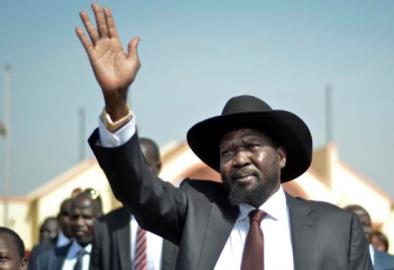South Sudan government defends 28 states unilaterally decreed by Kiir
October 5, 2015 (JUBA) – South Sudanese government has defended President Salva Kiir’s unilateral establishment order which expanded the country’s 10 states to 28, saying the move was legal.

“This order will be effective only after 30 working days,” said Korbandy, speaking in a briefing to representatives of foreign diplomats on Monday in Juba.
“This [thirty days period] is to give a time for the parliament to look at the order as per clause five of the authority of this order which empowers the president to initiate process to constitutional amendment. We have not violated our own constitution,” he said.
He said the decision to create more states is “actually a response to calls of our citizens,” as the government was trying to sell the decision to representatives of various countries.
“In Equatoria there is absolute call for federal system. In Bahr al Ghazal; the same. In Upper Nile; the same,” he added and described the order “a problem solving document given the geopolitics of our country.”
The government move surprised the armed opposition which said creating more states is a violation of the agreement signed in August twenty months of the conflict. The peace agreement is based on the current 10 states and deferred the process of federalism and creation of more states to the constitutional making process during the transitional period of 30 months.
The armed opposition faction led by former vice president, Riek Machar, said the 28 states’ creation after the peace deal will affect many provisions in the peace deal and open up the agreement for further negotiations.
The new 28 states will change the power sharing formula, restructure and increase the number of executive organ and appointment of new members to state legislative assemblies. It will also affect the membership of the national legislature. All of these, the opposition say, would need renegotiation to determine the composition and representation.
They also said the creation of the new states needs agreement on the number of states to be created, the basis for their creation and when they should come into effect, all of which would be handled by the government of national unity in accordance with the peace deal.
But information minister Michael Makuei Lueth said the agreement does not halt the president from performing his duties.
“The agreement says the government of Upper Nile shall be from the SPLM IO. If Upper Nile is divided into 10 states, that same provision will continue to apply on all the new states,” said Lueth, speaking alongside Korbandy.
He said the rational will apply in Upper Nile and Jonglei where the opposition will have 40% of the executive power share.
“So I didn’t see anywhere where we can come and say the agreement has been violated. Instead, it [the peace agreement] has been enriched,” he said.
Diplomats questioned why the unilateral decision was suddenly made after the peace agreement was signed by the parties. The head of European delegation in Juba, Stefano De Leo, inquired why the order was being announced when the agreement was just signed. But information minister Lueth insisted that the agreement “does not tight the hands of the president.”
“There is no provision in the agreement that tights down the hands of the president from rendering services and serve the interest of his people. The president is acting in accordance with provisions of the law,” he said.
Analysts say the move aims at appeasing loyalists of the president in Upper Nile, Unity and Jonglei states.
The war divided the country along tribal lines, pinning the largest tribes of Dinka and Nuer where President Kiir and rebel leader Riek Machar hail.
(ST)
